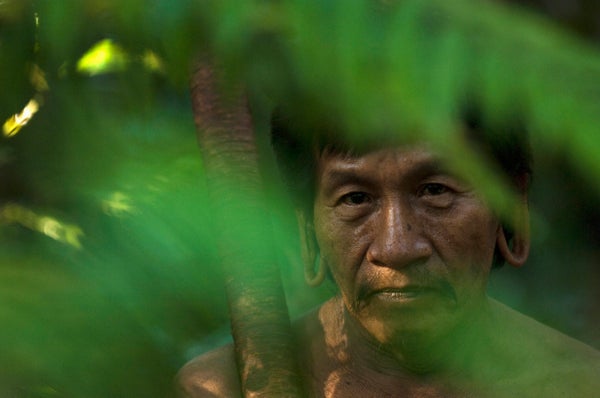This article was published in Scientific American’s former blog network and reflects the views of the author, not necessarily those of Scientific American
The United Nations recently released a preliminary report warning that global biodiversity is declining at an unprecedented rate, with approximately one million species currently at risk of extinction. However, the report noted biodiversity is declining at a significantly slower rate on lands governed by indigenous peoples, demonstrating their success as stewards of their natural environment. Biodiversity describes genetic diversity within and between species and is integral to the health and resiliency of ecosystems.
A decline in biodiversity will negatively impact humans in a number of different ways, ranging from food security to water quality. Considering this, it is imperative for indigenous knowledge to play an integral role in the fight to protect our sacred global biome.
Indigenous peoples across the globe have lived in harmony with their traditional lands for generations, living off the land and its resources while maintaining the integrity of the ecosystem itself. For indigenous peoples, sustainability is a necessity, for without it their own livelihoods are at risk. Traditional ecological knowledge and practices have been so successful that, although indigenous lands account for less than 22 percent of the world’s land area, their traditional territories are home to approximately 80 percent of the world’s biodiversity. This has led to a growing appreciation for the value of traditional ecological knowledge (TEK) in promoting sustainable land management and scientific discovery and in providing environmental data to support climate adaptation strategies.
On supporting science journalism
If you're enjoying this article, consider supporting our award-winning journalism by subscribing. By purchasing a subscription you are helping to ensure the future of impactful stories about the discoveries and ideas shaping our world today.
Increasingly, TEK is being recognized as complementary to modern science in supporting sustainable land and resource management. It is the product of indigenous peoples’ deep understanding of their environment, which has evolved over many generations. Traditional management practices, such as the ritualized burning of vegetation to improve soil productivity, are both culturally and ecologically important. Despite a history of marginalizing indigenous groups, the government of Australia recognized the strength of indigenous knowledge in managing the natural environment by establishing 75 Indigenous Protected Areas in the 1990s.
In these areas, indigenous peoples are entrusted with the management and preservation of their lands. In addition to serving as a key component of Australia’s biodiversity preservation strategy, the Indigenous Protected Areas program has conferred significant economic and cultural benefits for indigenous communities.
TEK can also unveil valuable information about the intricacies of environmental systems. By learning from centuries of careful observation and understanding the traditional practices of indigenous peoples, scientists can advance their understanding of natural systems. For example, the indigenous farmers of the Bolivian and Peruvian Andes successfully forecast weather patterns by observing the size and brightness of the Pleiades star cluster.
By observing the practices of these indigenous farmers, scientists discovered a link between El Niño and tropospheric cloud cover that scientists were not previously aware of. This discovery, and many others resulting from the traditional knowledge of indigenous peoples, demonstrates the important role that traditional ecological knowledge has to play in our collective understanding and management of the environment.
Climate change is already shifting ecological conditions and is a significant contributor to the currently ongoing biodiversity crisis. Indigenous communities are particularly vulnerable to climate-related shifts due to their close relationship with, and reliance on, local yet often fragile ecosystems. To improve the long-term resiliency of indigenous communities in the face of a changing climate, it will be imperative to identify climate-related shifts and develop effective adaptation strategies. There is a significant opportunity to utilize TEK to advance climate resiliency. First, TEK can establish baseline environmental data in regions where environmental monitoring has been limited or nonexistent.
With an improved understanding of historic conditions, scientists and other stakeholders are poised to better understand climate-induced changes. Secondly, indigenous communities have detected, coped and responded to environmental change for centuries. Deploying traditional understanding of managing environmental change should serve as a complement to modern science in the development of climate adaptation strategies.
Given the emerging biodiversity crisis, the development of effective strategies for managing and conserving natural ecosystems is becoming increasingly important. On a national and global scale, environmental conservation efforts and action against climate change have largely fallen short. On August 7, 2019, the United Nations released an additional report detailing the climate-induced land degradation and food security challenges that are expected to arise as the planet continues to warm. Importantly, the report emphasized the importance of engaging indigenous groups in land management and agricultural practices, noting that indigenous knowledge can help overcome climate-induced changes.
The inclusion of indigenous peoples in environmental management presents an important opportunity to learn from generations of careful observation while simultaneously reinforcing the right of indigenous peoples to use, access and act as stewards of their traditional lands. Environmental governance is strengthened by a growing number of collaborative initiatives aiming to include the perspectives and knowledge of indigenous peoples to improve environmental conservation and management.
Going forward, governments and resource managers must prioritize the continued development of collaborative platforms and management initiatives that promote the incorporation of TEK into environmental management and acknowledge the rights of indigenous peoples in inclusive environmental governance
